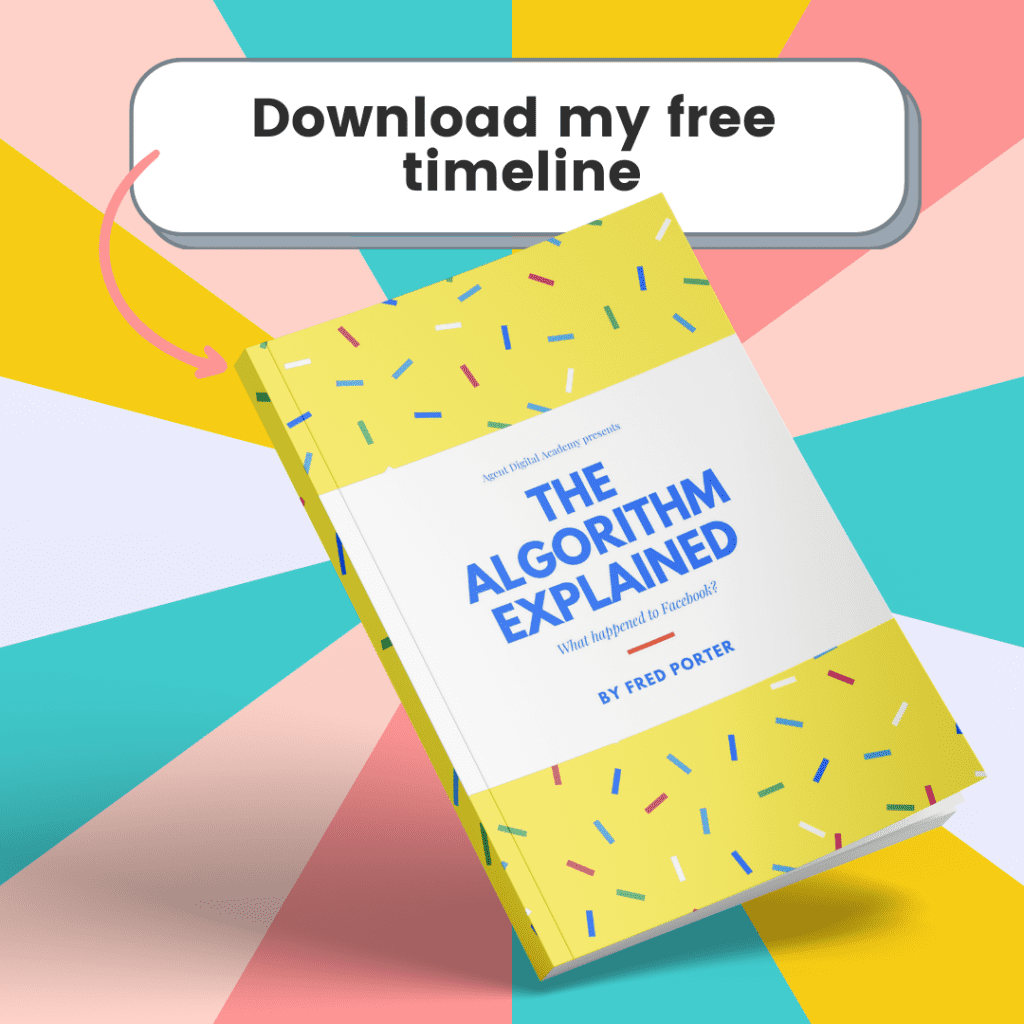It’s true that the reach of our Facebook Business Pages isn’t what it used to be. Since Facebook acquired Instagram 8 years ago, we’ve seen a similar thing happen there, slowly but surely the number of people seeing our posts has declined. Since the big announcement of a shift in priority in 2018, many of us focused on building an online community using Facebook Groups, which felt almost like the glory days when 100% of your fans were seeing your posts. Already this year we’ve had reports of a drop in Group engagement, and it’s clear that Facebook is moving in the direction of charging business (even more) to communicate with our people, as Sponsored Messages roll out in Facebook Messenger.
Pay to play?
Sure, but first you need to master the art of engagement, and if you can get that happening via your Business Page or Instagram Profile organically (without paying) then when you do put some money behind it, you will start to see good things again.
There is a lot of mystery out there surrounding the “big scary algorithm” from Facebook, and how it’s working against your business. Don’t take it personally. Let me explain what it is, and what you need to know to stand out (and save your time) in 2020, because one thing that hasn’t changed is that Facebook (and Instagram depending on your market) is still one of the best and most affordable ways to get new customers.
Put simply, the Algorithm is they way Facebook automates the content it wants us to see, based on whatever it decides is relevant at the time. There is so much content on the platform (from both personal and business profiles) that it is impossible to show everything to everyone. Our personal posts tend to circulate amongst our immediate family and friends, and our business posts are really only seen by our most engaged followers. The life-span of a post has also increased, they tend to hang around for days now, and as such there it’s now less important to post so frequently. That’s not to say consistency doesn’t matter, it absolutely does, but take a breath, slow down and consider what it is that you will say, and how often you need to say it in 2020.
This is how the new Algorithm works
The new Facebook algorithm ranks all available posts that can display on a user’s News Feed based on how likely that user will have a positive reaction. Greg Swan articulates this beautifully in his blog post on How The Facebook Algorithm Works In 2020.
Facebook’s algorithm for ranking and displaying content on your News Feed is based on four factors:
Inventory
The Inventory of all posts available to display. This includes everything posted from friends and publishers.
Signals
Signals that tell Facebook what each post is. What type of content, the publisher, its age, purpose etc. You want your content to signal to Facebook that it’s meaningful and relevant to your target audience.
Predictions
Predictions on how likely a user will have a positive interaction with your content. Facebook has a preference for authentic (motivational, aspirational, positive) and timely posts (immediate interest, current events, trending topics)
Score
A final Score is then assigned to the content based on all the above factors considered. We call this the Relevant Content Score, for obvious reasons.
So, before you make that Facebook or Instagram post for your business, consider if it is going to help you drive engagement. Don’t do the hard sell, don’t try to send traffic away from Facebook – that’s what Paid Ads are for, and if you are doing this at the posting/engagement stage, you’ve probably already found out it isn’t working for you. Will the person seeing this post relate to what you are saying? Will they feel compelled to like, comment or even share?
If you are spending hours and hours every week coming up with new content, but not seeing a return on investment (yes, your time is money too) then you probably need a different approach. The best performing Paid Ad Campaigns are supported by a consistent and engaging Posting strategy.
A conversation that I have with people all the time, is that they worked with a freelancer or agency and didn’t get the results they were expecting. Sure, there are some shady operators out there, but often clients don’t understand what it is they are paying for, and end up locked in to high cost monthly retainers and find the level of service (and results) dwindle over time. Someone recently said to me, “we paid a Social Media Manager for 12 months and they only built one Ad Campaign and it never really worked”.
Just like Posts are for engagement and Ads are for sales, there is a difference between a Social Media Manager and a Facebook Ads Specialist, and it’s quite rare to get someone who’s great at both these things – each job requires quite a different skill-set. A Social Media Manager will look after your channels, come up with engaging posts for all to see and respond to comments and incoming enquiries. An Ads Specialist will create high-converting Ad Campaigns, often not visible on your page but cleverly placed in all the right spots your potential customers will see. A high level of technical skill is required to target the right audiences and optimise your Ads for success, and as such you’ll often find they aren’t so great at the creative stuff – they have a technical mind. Every dollar you spend on Paid Ads should be measurable and accounted for, only then will you truly understand your return-on-investment.
I put together this really cool Timeline of Facebook Changes this year that goes into more details about how the Algorithm has changed into what we know today. It’s packed with tips on how to get the most from your Posts, and also touches on why pay for Ads, and how to get started. It’s free to download and available right now. I hope you find it useful.



Pointing out the difference between a social media manager and an ads specialist, is the best take away from this article. There is a great difference in the skillsets and there are not many people in freelancer or agency world that have both these skillsets, and as this is still a relative new area of expertise consumers don’t know the difference either! The rate the Facebook and other platforms update and or change themselves is at break neck speed and what worked last year doesn’t work this year is an all too common occurrence. You know your customers best and what they want to see on your Instagram feed, an ad specialist knows how to get your add to people who don’t know you yet!